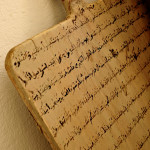-
The Intermediary of Shirk.
By Khalid WIlliams
Categories : Aqida, Fiqh, Sufism, The Prophet
From the Mafaheem of Sayyid ibn Alawi al-Maliki al-Makki
Many people falter in their understanding of the reality of intermediaries, and haphazardly rush to the judgement that any intermediary is Shirk, and that he who takes an intermediary, whatever the fashion, has associated partners with Allah, and that his state in this affair is that of the polytheists, who said ‘we do not worship them except that they might bring us near to Allah’ (Surat al-Zumar, 3). This statement is incorrect, and the attempt to use this Ayah as an evidence is here misplaced. This is because this noble verse is clear in its severe condemnation of the polytheists for their worship of idols as gods besides Allah, the Exalted, and their association of them with Him, claiming that their worship of these idols is nothing more than a means of drawing closer to Allah. The kufr and shirk of their action stems from their worship of these idols, and their belief that they are lords besides Allah.
Something of great importance which must be stressed here is that this Ayah confirms that the polytheists were not sincere in their attempt to justify their worship of idols by claiming that they used them to draw near to Allah. For had they been truthful in this assertion, Allah would have been greater to them than their idols, and they would not have worshipped other than Him. However, Allah forbade the Muslims from insulting the idols of the polytheists with His words: ‘Do not curse those upon whom they call beside Allah, lest they wrongfully curse and revile Allah through ignorance. Thus to every nation have we made their deeds seem fair. Then to their Lord is their return, when He will inform them of that which they used to do’ (Surat al-An’am, 108).
It is narrated from ‘Abd al-Razzaq, and ‘Abd ibn Hamid, and ibn Jarir, and ibn al-Mundhir, and ibn Abi Hatim, and Abu al-Sheikh, from Qutada (may Allah be pleased with him), who said: “The Muslims used to curse and revile the idols of the disbelievers, and so the disbelievers reviled and cursed Allah, the Mighty, the Magnificent. So Allah revealed ‘Do not curse those upon whom they call beside Allah, lest they wrongfully curse and revile Allah through ignorance’.” This is the reason for the revelation (sabab nuzul) of the Ayah, which strongly forbids the believers from uttering insults against the idols that the polytheists used to worship in Makkah, because such insults would inevitably enrage those who believed in their hearts that those statues and idols were gods, with the ability to benefit and harm. This rage would drive them to meet the Believers with similar insults against the One whom they worshipped, the Lord of the Worlds, and so they would ascribe to Him defects, though He is utterly free of all defects. Again, if they were truly sincere in their claim that their idol-worship was only a means of drawing closer to Allah, they would not have dared insult Him to avenge their idols when they were insulted. It is entirely clear from this that the polytheists held Allah in far less esteem than they held their own idols.
This is also apparent from Allah’s words ‘And if you were to ask them who created the heavens and the earth, they would surely say “Allah!”’ (Surat al-‘Ankabut, 61). If the polytheists had truly believed that Allah the Exalted is the only Creator, and that their idols had not created anything, they would have worshipped Allah instead of their idols, or at the very least their reverence towards Allah would have been greater than their reverence towards their stones and statues. Is this consistent with their utter vilification of Allah, the Mighty, the Magnificent, out of vigilance for their own idols against Him? It is abundantly clear that it is not consistent in the slightest. Furthermore, the Ayah that we are considering is not the only evidence that Allah was lower in the esteem of the polytheists; rather it has many counterparts. Of them is the statement of Allah the Exalted: ‘They assign to Allah a portion of the crops and cattle which He created, and they say “this is for Allah”, in their imagination, “and this for (His) partners in regards to us.” Thus, that which they apportion for His partners in them does not reach Allah, and that which they apportion to Allah goes to their partners. Evil is their ordinance’ (Surat al-An’am, 137.) If they did not hold Allah in lesser esteem than their idols, they would not have weighed against Him this bias, which as related in the Ayah merited the judgment of Allah upon them: ‘Evil is their ordinance.’
Further evidence is the call of Abu Sufyan (may Allah be pleased with him), before he entered Islam, ‘Hubal, be though exalted!’ as was related by Bukhari, calling upon the idol named ‘Hubal’, in order that he might, in that moment of conflict[1], overwhelm the Lord of the Heavens and the Earth and His army of Believers, who desired to overwhelm their idols. This is a clear measure of the state of the polytheists, and how they viewed their idols in relation to Allah, the Lord of the Worlds.
It is essential that this be understood with true comprehension, for too many people build their arguments upon it without any understanding.
Do you not see that when Allah ordered the Muslims to face the Ka’aba in their prayers, they turned towards it when they worshipped, and took it as a direction of prayer (Qiblah)? The worship was not directed to the Ka’aba, and nor is the kissing of the Black Stone anything other than the worship of Allah the Exalted, and the imitation of the Prophet (may the Peace and Blessings of Allah be upon him and his family and companions). Were any of the Muslims to intend to worship to either of them, he would be a polytheist, like those who worship idols.
To worship Allah by means of intermediaries is essential, and cannot be termed shirk, and it cannot be said that everyone who takes an intermediary between him and his Lord is a mushrik; if it were otherwise, then every single human being would be a polytheist, for all of our affairs require intermediaries. The Prophet (may Allah bless him and give him peace) received the Qur’an through the intermediation of Jibril, and so Jibril is the intermediary of the Prophet (may Allah bless him and give him peace), and he was the greatest intermediary to the Sahaba (may Allah be pleased with them), for they would rush to him in times of crisis, and complain of their needs to him, and seek his intercession and Du’a. In these times, the Prophet (may Allah bless him and give him peace), never said to them ‘you have committed shirk and kufr! It is not permissible to complain to me, nor to seek anything from me; rather you must go and supplicate and ask Allah yourselves, for verily Allah is closer to you than I am!’ Rather he would stand and supplicate for them, although they knew full well that the Bestower in reality is Allah, and that the Preventer, and the Expender, and the Provider is Allah alone, and they knew also that the Prophet (may Allah bless him and give him peace) would not avail them anything save with the permission of Allah, and through His Bounty. The Prophet himself (may Allah bless him and give him peace) said ‘I am nothing but an apportioner; Allah is the one who bestows.’[2]
Therefore, it becomes evident that it is permissible and correct to describe any ordinary person as one who delivers from distress, and satisfies needs; that is, that he is an intermediary for them, so what of the Noble Master and Eminent Prophet, the Most Illustrious of Mankind and Jinn, the Undisputed Best of Creation? Did the Prophet (may Allah bless him and give him peace) not say ‘he who delivers a Muslim from distress, Allah delivers him from the distress of the Day of Resurrection[3]’? So the Believer is a deliverer from distress and crisis.
Did he not say (may Allah bless him and give him peace) ‘he who fulfils the need of his brother, I will stand at his balance (on the Day of Judgement), and if (his good deeds) do not outweigh (his bad), I will intercede for him.[4]’? So the Believer is a fulfiller of needs.
Did he (may Allah bless him and give him peace) not say ‘he who shelters a Muslim, Allah will shelter him on the Day of Resurrection[5]’?
Did he (may Allah bless him and give him peace) not say ‘verily, Allah has among His creation those who are sought for in times of need[6]’?
Did he (may Allah bless him and give him peace) not say ‘Allah is engaged in the aid of his servant as long as the servant is engaged in the aid of his brother[7]’?
Did he (may Allah bless him and give him peace) not say ‘he who comes to the aid of someone in need, Allah writes for him ninety-three good deeds[8]’?
So the Believer relieves hardships, aids, protects, fulfils needs, and is sought out in times of trial, although in reality it is Allah, Exalted and Magnificent, who aids, fulfils, and protects. However, as the Believer is the intermediary in all of this, attributing the actions to him is entirely appropriate.
Many Hadiths have been related from the Prophet (may Allah bless him and give him peace) which illustrate that Allah, Sublime and Exalted, alleviates punishment from all who dwell on the earth by means of those who seek His forgiveness, and those who maintain His mosques, and that by their means He provides the masses with sustenance and support, and protects them from trials and perils.
Tabrani related in ‘al-Mu’jam al-Kabeer,’ and Bayhaqi in ‘al-Sunan’ from Mani’ al-Daylmi (may Allah be pleased with him) that the Prophet (may Allah bless him and give him peace) said ‘Were it not for the sake of certain servants of Allah whom He makes bow to Him, and certain infants whom He makes suckle, and certain cattle whom He makes graze, He would unleash His punishment upon you all, and would destroy you utterly.’
Bukhari related from Sa’ad ibn Abi Waqqas (may Allah be pleased with him) that the Prophet (may Allah bless him and give him peace) said ‘are you given victory and sustenance except by means of those of you who are weak?’
Tirmidhi related from Anas (may Allah be pleased with him), that the Prophet (may Allah bless him and give him peace) said ‘it may be that you are provided with sustenance by means of him.[9]’ Al-Hakim declared this Hadith to be Sahih.
Abdullah ibn ‘Umar (may Allah be pleased with them both) narrated that the Prophet (may Allah bless him and give him peace) said: ‘Verily, Allah has men whom he created for the needs of the people, who rush to them in times of crisis. They are those who are safe from the punishment of Allah the Exalted[10].’
Jabir ibn Abdullah (may Allah be pleased with him) narrated that the Prophet (may Allah bless him and give him peace) said: ‘Truly, Allah confers righteousness upon a Muslim’s child, and his grandchild, and his family, and the families of his neighbours, by means of that Muslim’s piety and righteousness, and they are in the protection of Allah as long as he is amongst them.[11]’
Ibn Umar (may Allah be pleased with them both) narrated that the Prophet (may Allah bless him and give him peace) said: ‘Verily Allah, by the means of a pious Muslim, protects one hundred of his neighbours from hardship and strife.’
Ibn Umar then recited the Ayah ‘And had Allah not repelled some people by means of others, the earth would have been corrupted’ (Surat al-Baqarah, 251).[12] A Hadith is related from Thawban[13] which states ‘There will remain among you seven men by whom you will be given victory, rain and sustenance until the Affair of Allah arrives (the Day of Judgement).’
‘Ubada ibn al-Samit narrated that the Prophet (may Allah bless him and give him peace) said ‘The Adbal[14] of my community are thirty, by means of them you are all provided with sustenance, rain and victory.’ Ubada said ‘I hope al-Hasan[15] to be one of them [16].’
The four preceding Hadiths were mentioned by al-Hafidh ibn Katheer in his Tafseer of the above Qur’anic Ayah ‘And had Allah not repelled some people…’ and they are appropriate to be used as proofs, indeed by their body the content becomes Sahih (rigorously authenticated).
Anas bin Malik (may Allah be pleased with him) narrated that the Prophet (may Allah bless him and give him peace) said: ‘The earth will never be deprived of forty men of the like of the Intimate friend (khalil) of Allah,[17] by means of them you are given water and succour. Each time one of them dies, Allah substitutes another in their stead[18].’
The Greatest Intermediary
On the Day of Resurrection, the Day of Tawheed, the Day of Iman, the Day in which the Throne will appear, the benefit of the greatest intermediary will come to light: that of the possessor of the Praiseworthy Station (al-Maqam al-Mahmoud), he whose intercession is never rejected, and whose surety is never dispelled by He who promised never to disappoint him, or debase him, or dismay him, or grieve him on account of his community, when all of creation seek him out and plead for his intercession, and he stands before his Lord and does not return except with the height of nobility and honour revealed to us by the words of Allah to him: ‘O Muhammad! Raise your head, and intercede, your intercession will be met; and ask, you shall be given!’
May the peace and blessings of Allah be upon him, and upon his family, companions, and all those who follow them until the Day of Judgement.
Translated from the book ‘Notions which must be Corrected[19]’, by the Eminent and Noble Prophetic Scion and Imam of the People of Hijaz, the Late Sheikh Sayyid Muhammad ibn al-Alawi al-Maliki al-Hassani. May Allah forgive him and be pleased with him, and reward him from His infinite bounty; and may He benefit us with his works that we might better serve His Deen and the community of His Noble Prophet, may the peace and blessings of Allah be upon him. Amin.
NOTES
[1] At the Battle of Uhud.
[2] Related by Bukhari from Mu’awiyah (may Allah be pleased with him)
[3] Related by Bukhari and Muslim from ibn Umar (may Allah be pleased with them both)
[4] Related by Abu Na’eem from ibn Umar (may Allah be pleased with them both)
[5] Related by Bukhari and Muslim from ibn Umar (may Allah be pleased with them both)
[6] See below for the reference for this Hadith
[7] Related by Muslim and Abu Dawud and others from Abu Huraira (may Allah be pleased with him)
[8] Related by Abu Ya’la and al-Bazar and Bayhaqi
[9] Full text of the Hadith : ‘There were two brothers at the time of the Prophet (may Allah bless him and give him peace), of whom one would come to the Prophet (may Allah bless him and give him peace) to seek knowledge, and the other would work to provide for them both. The worker felt that the situation to be unfair and complained about his brother to the Prophet (may Allah bless him and give him peace), who replied: ‘it may be that you are provided with sustenance by means of him.’
[10] Related by Tabrani and Abu Na’eem and al’Qada’i with a good (hasan) chain
[11] Related by ibn Jareer, and by Tabari in his Tafseer
[12] Related by Tabrani
[13] A servant of the Prophet (may Allah bless him and give him peace)
[14] The Substitutes. Explanation of their status is to be found in the Hadith below related by Anas ibn Malik, Insha Allah.
[15] Al-Hasan al-Basri, one of the Tabi’een.
[16] Related by Tabrani
[17] The Prophet Ibrahim (peace be upon him)
[18] Related by Tabrani. These are the Abdal (Substitutes).
[19] Mafaheem Yajib an Tusahhah






